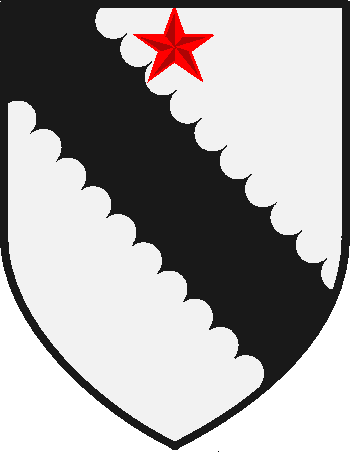Sir William RADCLIFFE of
Ordsall
Born: 1502, Ordsall, Lancashire, England
Died: 12 Oct 1568, Ordsall,
Lancashire, England
Buried: Manchester Church,
Lancashire, England
Father:
Alexander RADCLIFFE
of Ordsall (Sir Knight)
Mother:
Alice
BOOTH
Married 1: Margaret
TRAFFORD (dau. of Sir Edmund Trafford)
Children:
1.
Alexander RADCLIFFE
(Sir)
2.
John RADCLIFFE
of Ordsall (Sir)
3.
Richard RADCLIFFE
of Newcroft (Sir)
4. Alice RADCLIFFE
5. Ellen RADCLIFFE
Married 2: Anne CATTERALL (d. 1551) (dau. of Ralph
Catterall) (w. of Sir John Towneley of Towneley, High Sheriff of
Lancashire) ABT 1542
Married 3: Catherine BELLINGHAM (dau.
and co-heiress of Sir Robert Bellingham of Burneside) (w. of Sir Richard Assheton of Middleton)
Sir William took part in the Scottish expedition
of 1544, when the Earl of Hertford invaded Scotland and laid siege to Edinburgh
and Leith. For his services in the campaign William was knighted, and a similar
honour was conferred upon his brother-in-law, Edmund Trafford. In the Military
Muster of 1553 Sir William Radcliffe, Sir Edmund Trafford, and Sir John Atherton
were appointed to command the Salford contingent.
In 1558 Calais was
lost, and in the following Queen Mary
died. During her reign many who were persecuted by the tyranny of the
Queen's
fanaticism had fled to Scotland and found refuge amongst the reformers in that
kingdom, where national feeling resented the domination of Catholic France in
their affairs, and on the accession of
Elizabeth looked hopefully to the Protestant Queen of England to
uphold her claims. When Henri II of France died from a would received in jousting
at a tournament and was succeeded by his son, Francois II, the husband of
the young Mary Stuart, Queen of Scots,
Elizabeth was forced to action in defence of her own
realm. Mary and her consort styled themselves King and Queen of England, and the
Duke of Guise sent troops to Scotland to subdue the nationalist reformers,
preparatory to asserting his niece's claim to the English throne and rousing the
Catholic north of England to her support. The Lords of the Congregation sent
secret emissaries to the English Court to beseech
Elizabeth's help. The
Queen
hated Knox and the Calvinists and would not have moved to their support but for
the help which France had sent to Marie De Guise, Queen-Regent of Scotland and the
impertinence of Francois and Mary in assuming the title to England. A fleet of
fifteen sail was despatched to the Firth of Forth, and an army of eight thousand
men was assembled on the Border. Levies of men and of arms were raised
throughout the northern counties, and the
Earl of Derby's despatch to
Cecil
mentions amongst those rendering this aid, 'Sir William Radcliffe, his son and
heir, Alexander, who is a handsome gentleman, and Sir John Atherton, joined with
them, and furnishing between them 100 men'.
Though still presumably Catholics
the Radcliffes of Ordsall held their Queen and the realm entitled to their first
loyalty. They maintained a close association with their FitzWalter cousins and
doubtless were influenced largely by this friendship. By his will, made shortly
before his death in 1556, Henry Radcliffe, second Earl of Sussex, settled the
FitzWalter estates after the failure of his own heirs on Sir William Radcliffe
of Ordsall and the heirs male of his body.In the year 1568 Lancashire was visited by one of the recurrent sicknesses
which at intervals swept the country, taking dread toll of rich and poor without
discrimination. In Sep, Alexander Radcliffe,
Sir Williams eldest son, fell a
victim to the plague, and within three weeks his father also sickened and died,
his end hastened by the untimely death of his beloved and most promising son.
Sir William died at Ordsall on the 12 Oct 1568. He had increased his
patrimony extensively. Shoresworth had been merged in the demesne of Ordsall,
which with two water-mills, a fulling-mill, etc., was held by the
Queen by a
sixth part of a knight's fee, a rent now increased to sixtynine shillings and
eightpence. He had seventeen burgages in Salford, and 100 acres of land there.
The hamlet of Oldfield, lying between Ordsall and the town of Salford, was his,
with twenty burgages and 30 acres of land. All was held of the
Queen in free
burgage and socage, under the borough charter, by a rent of twelve shillings. He
had manors and lands in Flixton, Hope, Monton, Newcroft, Moston, Tockholes,
Livesey, Oakenrod, Spotland, and Radcliffe.
He was succeeded by his second son,
Sir John.Sir William was thrice married. After the death of
Margaret
Trafford, who
bore him three sons and two daughters, he married
Anne, the daughter of Ralph
Catterall, the widow of Sir John Towneley of Towneley, High Sheriff of
Lancashire from 1531 to his death in 1540. This marriage, of which there was no
issue, took place about 1542, and Anne died in 1551. Some time after this
Sir William married a third wife in Catherine Bellingham, youngest daughter
and co-heiress of Sir Robert Bellingham of Burneside, in the county of
Westmorland, the widow of Sir Richard Assheton of Middleton. Sir William was
buried in Manchester Church, and on his monumental brass was inscribed.
'Sandbach cor retinet, servat Mancestria corpus,Caelestem mentem regna superna
tenent.'
For more information, see:
Ordsall Hall, a Tudor Manor House
 to Bios
Page
to Bios
Page to Family Page
to Family Page to Peerage Page
to Peerage Page to Home Page
to Home Page to Bios
Page
to Bios
Page to Family Page
to Family Page to Peerage Page
to Peerage Page to Home Page
to Home Page